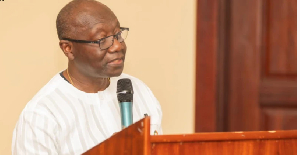Business News of Tuesday, 13 October 2015
Source: B&FT
Gas pricing policy a disincentive to investment – ACEP
The Executive Director of the African Centre for Energy Policy (ACEP), Dr. Mohammed Amin Adam, has decried some provisions in the Ghana gas pricing policy -- calling it a disincentive to investors who wish to invest in the country’s power plants.
In an interview with the B&FT at a stakeholders’ workshop held in Accra on the theme ‘Natural Gas Pricing and Utilisation Regulation’, the head of the think-tank said the situation will give Nigeria an advantage at the expense of Ghana’s economy.
“If domestic prices are much higher than imported gas then it is bad for the economy. VRA imports gas from Nigeria at US$1.6 per million Btu, but they buy gas from Atuabo at US$2.9 per million Btu. This makes Ghana gas more expensive compared to Nigeria. And so if an investor wants to put up a power plant and has to choose between Ghana and Nigeria, which both have power challenges, where do you think that investor will choose? He will definitely choose Nigeria because he will have cheaper gas in Nigeria than Ghana. This situation makes the economy very uncompetitive,” he said.
He revealed that what has created the situation is government’s action stated in the policy to create a rent fund from the sale of gas to finance other projects -- an objective Dr. Adam thinks premature and ambitious for a country that has just started its gas production, adding that it will transfer an unfair cost to consumers.
“Government is creating a gas rent fund and seeking to surcharge every gas unit that is sold by the aggregator (GNPC) so it can be used to take care of other expenses like financing budgets and providing rebates. I don’t think this is fair, because the government should be doing things to reduce gas price so that VRA can produce power at cheaper rates -- which will literally translate into lower electricity tariffs to consumers.
“It appears that we are more focused on rent capture, even though we just started producing gas. Meanwhile, the rent capture objective should come in when country is maturing in oil production or gas production. But as a frontier country, our focus should be investment, competitiveness and providing the enabling environment for competition, but not to do what other countries who have been in the business for about 20 years are doing now,” he noted.
Dr. Adam however lauded government’s effort for the introduction of a gas pricing policy that will serve as a guide to the way the country’s gas business is transacted, but advised government to eliminate all factors that will inflate gas prices in the country.
Commenting on the same theme, Anthony Paul, Managing Director, Association of Caribbean Energy Specialists Ltd. and a consultant for the Ministry of Petroleum, also noted that a clear-cut and defined legislation should be spelt out and followed by the officials who will be put in charge to oversee affairs of the project in order to ensure that the economy gains.
“You have to understand where you want to go. And after you understand that, you have to put in place rules to be followed; otherwise, people will come and think differently and do their own thing, and you won’t get the desired outcome. So it will be the responsibility of the person in charge to oversee that those guidelines are followed and everybody plays their roles well,” he said.












